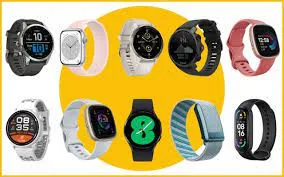INTRODUCTION
In today’s tech-savvy world, fitness trackers have become indispensable tools for individuals looking to achieve their weight loss goals. These sleek, wearable devices do more than just count steps; they provide comprehensive data on various aspects of physical activity and overall health, making them powerful allies in the journey towards a healthier lifestyle. This article delves into how fitness trackers can be effectively utilized for weight loss, ensuring you maximize their potential to achieve your goals.
The Role of Fitness Trackers in Weight Loss
FITNESS TRACKERS FOR WEIGHT LOSS are designed to monitor and record various metrics related to physical activity and health, such as steps taken, distance traveled, calories burned, heart rate, sleep patterns, and more. By providing real-time feedback and long-term trends, they help users stay informed and motivated. Here’s how fitness trackers can aid in weight loss:
Setting and Tracking Goals
One of the primary benefits of fitness trackers is their ability to set and monitor personal fitness goals. Whether it’s aiming for a specific number of steps per day, a particular calorie burn target, or a weight loss milestone, fitness trackers provide the data needed to track progress. This constant feedback can be highly motivating, encouraging users to stay active and make healthier choices throughout the day.
Monitoring Physical Activity
Fitness trackers measure various forms of physical activity, from walking and running to cycling and swimming. By recording the intensity and duration of workouts, they help users understand how much exercise they are getting and how it impacts their weight loss goals. The ability to see detailed reports on physical activity can motivate users to push themselves harder, try new workouts, and maintain a consistent exercise routine.
Calorie Tracking and Management
Many fitness trackers come with apps that allow users to log their food intake and monitor their calorie consumption. By comparing calories consumed with calories burned, users can manage their diet more effectively. This balance is crucial for weight loss, as it helps ensure that calorie intake is less than the calories expended through physical activity.
Heart Rate Monitoring
Heart rate is a key indicator of physical exertion and overall fitness. Fitness trackers with heart rate monitors provide real-time data on how hard the heart is working during exercise. This information can help users adjust their workout intensity to stay within their optimal heart rate zones for burning fat and improving cardiovascular health. Understanding heart rate patterns also aids in preventing overtraining and reducing the risk of injury.
Sleep Tracking
Adequate sleep is essential for effective weight loss. Poor sleep can lead to weight gain by disrupting hormones that regulate hunger and metabolism. Fitness trackers that monitor sleep patterns provide insights into sleep quality and duration. Users can identify factors that affect their sleep and make necessary adjustments to improve their rest, which in turn supports their weight loss efforts.
Choosing the Right Fitness Tracker
With a plethora of FITNESS TECHNOLOGY available on the market, choosing the right one can be overwhelming. Here are some factors to consider when selecting a fitness tracker for weight loss:
Features
Ensure the fitness tracker has the features that align with your weight loss goals. Essential features include step counting, calorie tracking, heart rate monitoring, and sleep tracking. Advanced features like GPS tracking, guided workouts, and water resistance can also be beneficial.
Compatibility
Check if the fitness tracker is compatible with your smartphone and other devices. This compatibility ensures seamless data synchronization and access to comprehensive reports and insights through accompanying apps.
Battery Life
A fitness tracker with a long battery life is convenient and reduces the hassle of frequent charging. Look for trackers that offer at least 5-7 days of battery life on a single charge.
Comfort and Design
Since you’ll be wearing the fitness tracker for extended periods, comfort is crucial. Choose a tracker with an adjustable strap and a design that suits your lifestyle and personal preferences.
Maximizing the Benefits of Fitness Trackers
To make the most of your fitness tracker and optimize your weight loss journey, follow these tips:
Consistency is Key
Wear your fitness tracker consistently to ensure accurate data collection. Regular use provides a comprehensive overview of your activity levels and progress over time.
Set Realistic Goals
Set achievable and realistic weight loss goals based on your fitness level and lifestyle. Break down larger goals into smaller, manageable milestones to stay motivated and track progress effectively.
Use the Data Wisely
Analyze the data provided by your fitness tracker to identify patterns and areas for improvement. Use this information to adjust your exercise routine, diet, and sleep habits to better align with your weight loss goals.
Stay Active Throughout the Day
Incorporate more physical activity into your daily routine. Simple changes like taking the stairs, walking during breaks, and standing while working can contribute to your overall activity levels and support weight loss.
Engage in a Variety of Workouts
Variety in workouts prevents boredom and challenges your body in different ways. Use your fitness tracker to explore different types of exercises and find what works best for you.
Join a Community
Many fitness tracker apps offer social features that allow you to connect with friends, join challenges, and share progress. Engaging with a community can provide support, motivation, and accountability.
Conclusion
Fitness trackers are powerful tools that can significantly enhance your weight loss journey. By providing valuable insights into your physical activity, calorie consumption, heart rate, and sleep patterns, they help you make informed decisions and stay motivated. Choosing the right fitness tracker and using it consistently and wisely can make a substantial difference in achieving your weight loss goals. Embrace the technology, stay committed, and watch as your hard work and dedication lead to a healthier, fitter you.






0 Comments